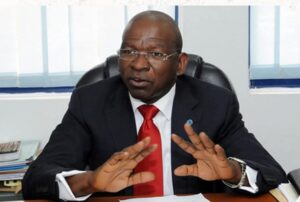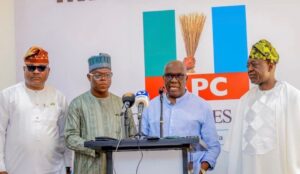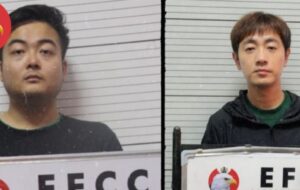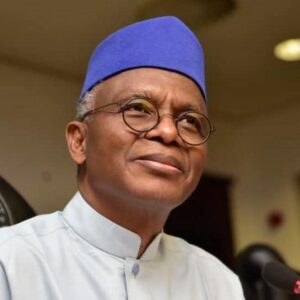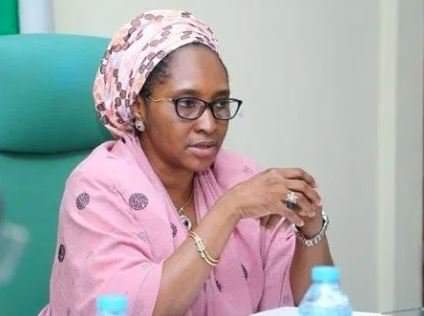
The Federal Government projects to spend N500 billion in fighting the spread of Coronavirus in the country and ensuring that the economy does not collapse under the weight of the scourge.
It is currently lobbying the leadership of the National Assembly on a proposed executive bill to set up a N500 billion COVID-19 Crisis Intervention Fund.
Finance, Budget and National Planning Minister Zainab Ahmed met with some principal officers of the two chambers yesterday to set the ball rolling.
For its part, the House of Representatives wants to pass a bill to grant electricity consumers a two month waiver as a palliative measure following the economic hardship induced by the pandemic.
Nigeria recorded five new cases yesterday to bring the tally to 214.
This is as experts in the health sector described the move by the federal government to convert the over 300 GeneXpert machines, hitherto, used for the diagnosis of Tuberculosis (TB) and HIV, for coronavirus (COVID-19) testing, as a game-changer.
Mrs Ahmed met with Senate President Ahmad Lawan, House of Representatives Speaker Femi Gbajabiamila, Deputy Senate President Ovie Omo-Agege, House of Reps Deputy Speaker Idris Wase among other principal officers of the NASS.
It was a follow up to the one held penultimate Wednesday between the National Assembly leadership and members of the Presidential Committee which was set up to manage the COVID-19 crisis.
“What we are proposing is an establishment of a N500 billion COVID-19 Crisis Intervention Fund,” the minister said at yesterday’s meeting.
“This Fund that we are proposing, that should be created, will involve mopping up resources from various special accounts that the government as well as the Federation have, to be able to pull this N500 billion.”
Mrs. Ahmed said that in addition to the identified special accounts from where the money will be drawn as loans, the proposed intervention fund would also be sourced from grants being expected and loans from multilateral Institutions.
She said: “Our general view is that this crisis intervention fund is to be utilised to upgrade healthcare facilities as earlier identified.
“The Federal Government also needs to be in a position to improve health care facilities not only in the states but to provide intervention to the states.”
The proposed fund is expected also to take care of special Public Work Programmes being undertaken by the National Directorate of Employment (NDE).
“We know that there will be a need for the parliament to agree and approve the taking of loans from these special accounts and we will be coming back with a proposed bill in that regard that will define what the fund will be used for,” the minister said.
The Senate President said at the meeting that it was in fulfilment of an earlier promise to provide support as the need arises during this time of crisis.
“Governance requires that we work together, so we want to listen to those things that you have on your side and how we can also play our constitutional role in ensuring that Nigerians continue to benefit from governance and how we are able to weather the storm created by COVID-19.
“Going forward, we need to interact more because very fundamental decisions will need be taken, and these decisions can only be said to be constitutionally legal if the legislature gives its stamp of authority for the executive to implement and execute.
“I think coming to us for those loans is critical because we are in an emergency and time is of essence. So, we must work as expeditiously as possible to ensure that we place the request before the National Assembly.
“I think time has come for us to redefine the implementation of the Social Intervention Programme, probably going out to communities to give them N20,000 per person might not be the best way to go. It is still an effort, but I think we need a better approach that will be more efficient.”
Reps coming with bill on free electricity for two months
House of Reps Speaker Gbajabiamila said the chamber was working on a stimulus bill that will grant Nigerians waiver for electricity bill payment for two months.
But he said Nigeria must prepare for the effects of COVID-19 on the economy.
He said the waiver bill was to mitigate the effects of the COVID-19 pandemic on Nigerians and to help in boosting the economy through the informal sector.
Of the bill, he said: “It is one thing that will touch every household. As I said earlier, when we engaged, I discussed with the electricity Distribution Companies (DisCos) that packaged whatever they would require, if the government can give them, for us to allow for two months free electricity for Nigerians, they would be able to guarantee it.
“We have the figures. I think we should look very seriously into that as part of our package for economic stimulus, because stimulus means something that will stimulate the economy. When you are stimulating the economy, most of it will come from the informal sector.
“When you are saving people their electricity and the fact that they now have stable electricity for two months, you are also saving the monies that would go into the payment of those bills at least for two months.”
Nigeria records five new COVID-19 cases, 214 in total
The Nigeria Centre for Disease Control (NCDC) yesterday reported five new cases of coronavirus in the country to take the tally to 214.
Three of the new cases are in Bauchi and two in the FCT, Abuja.
It said 25 cases have been discharged.
Death toll remains 4.
Lagos tops the chart with 109 cases followed by FCT with 43 and Osun 20.
Oyo has 9; Akwa Ibom – 5; Ogun – 4; Edo – 7; Kaduna – 4; Bauchi – 6; Enugu – 2; Ekiti – 2; Rivers – 1; Benue – 1;and Ondo – 1.
It clarified its update for Friday saying total cases as at then was 209 and not 210 as was posted on its website.
NNPC confirms COVID-19 case at Abuja estate
A COVID-19 case was yesterday found at the Nigerian National Petroleum Corporation (NNPC) estate at Garki, Abuja.
However, the case is not a staff of the corporation.
The Group General Manager, Group Public Affairs Division of the NNPC, Dr. Kennie Obateru, described him as a returnee from the United Kingdom.
He was said to have developed symptoms of the infection.
“His case was said to have been confirmed positive by the NCDC after undergoing a laboratory test,” Obateru said in a statement.
“And in line with NCDC approved protocol, all residents of the affected apartment were moved out and placed in Isolation, while officials of NCDC undertook disinfection of the flat and adjoining areas to eliminate the chances of community infection.
“The Corporation had long embarked on public awareness campaigns within NNPC and beyond her borders including sharing with the residents of the estate guidelines on successful self-supervised isolation to ensure strict adherence to all NCDC prescribed safety measures designed to tackle the COVID-19 global pandemic.”
Testing with GeneXpert machines a game-changer – Experts
Experts in the health sector have described the move by the federal government to convert the over 300 GeneXpert machines , hitherto used for the diagnosis of Tuberculosis (TB) and HIV, for coronavirus (COVID-19) testing, as a game-changer.
Speaking with the Nation, the National Professional Officer-in-Charge of Tuberculosis at the WHO, Dr. Ayodele Awe, said: “For us, this will be a good collaboration between a disease entity that is pandemic and the other (Tuberculosis), that already has a diagnostic tool.
“There are 398 machines in the country that are procured by partners – WHO, USAID, Global Funds, and are spread all over 774 local governments. They are the source for diagnosing tuberculosis.
“Currently, there are a lot of challenges with testing for COVID-19, as many persons have complained of not being able to access testing. Therefore, for effective monitoring of COVID-19, there is need to decentralized and expand testing services. That is when we will know the impact of the COVID-19 at the community and state level.
“So, this is good news for Nigerians because if the GeneXperts are integrated into the testing chain, people can invariably have access to the 398 diagnostic centres with the machines for testing.
“This will rapidly increase our diagnosis and ensure that every person that has the disease is detected before the spread. For us, we are eagerly ready to collaborate with the COVID-19 team to use these machines.”
In a separate interview, the Executive Director of KNCV Nigeria, Dr. Bethrend Odume, said: “We can use the machine to test for Tuberculosis with a different cartridge, and can even use it to test for human papilloma virus with a different cartridge or even viral load for HIV. Now they have discovered another cartridge they call Xpress SARS-CoV-2, that can be used to test for coronavirus.
“Presently in Nigeria, the testing capacity is low, access to testing is low and many people want to test and are really on the queue. But the ground breaker in the whole arrangement is the discovery by the Cepheid team – that you can use that cartridge on any GeneXpert platform and you will be able to get a result in 45 minutes.
“The good thing is that there are 10 DR TB labs in the country that have this capacity and all have GeneXpert machines that can be targeted first”.
He added: “On the issue of human resources, they need to be trained on the precautionary measures. They also need to be supported with adequate electricity or alternative power source because some of these GeneXpert machines are not being optimized because of power.
“When you run the GeneXpert machine, it is expected to work within a given ambience temperature, and when there is no AC, they keep on breaking down. If these requirements are in place, I think the facilities will be in the best position to support the epidemic response.
“For now, I know that there are many channels of making orders to Cepheid, but our office is already working with the Nigeria Centre for Disease Control (NCDC), and we have placed orders for 5,000 cartridges”.
For the Registrar/Secretary General, West African Postgraduate College of Medical Laboratory Science (WAPCMLS), Abuja, Dr. Godswill Okara, “It is a step in the right direction and that is the way to go. We have said now and again, that’s while we commend the Federal Ministry of Health, the NCDC, and the Presidential Task Force, for the good job they are doing in updating the public and giving out appropriate information and guidelines, the right thing to do is to take further steps to increase the testing methodologies and testing centres.
“The centrality of laboratory testing in the containment efforts of the outbreak is very obvious because the World Health Organization (WHO) made it clear, when its Director-General said ‘our simple message to all countries is test test test’.
“More so, the continuous information has tended to produce fear and panic among the populace. So, the only way to also allay that fear is to ensure that access to testing is decentralized and people are able to get tested in order to have their minds at rest.”






